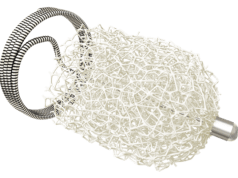Eric Ducasse (University of Bordeaux, Bordeaux, France) spoke with Vascular News at this year’s Leipzig Interventional Course (LINC 2023; 6–9 June, Leipzig, Germany) on the use of artificial intelligence (AI) in vascular interventions.
He said there is potential for AI—and specifically deep learning—to be used to automatically segment carotid lesions, for example. This, he explained, might subsequently be able to provide details on the amount of calcium versus the amount of thrombus or soft plaque in the lesion, which can then be linked with clinical event data.
Currently, Ducasse explained there are only “very preliminary” results available on the topic, which demonstrate that soft plaque is linked with the symptoms of stroke events, while calcified lesions are mostly associated with asymptomatic lesions.
There is a need now, he stated, to conduct some prospective studies in order to gain a stronger evidence base.
Ducasse also touched on the potential of AI in other vascular domains, including abdominal aortic aneurysm (AAA). “There are a lot of possibilities,” he remarked. “That is why [it] is very exciting and very interesting to be deeply involved in the deep learning evolution.”












